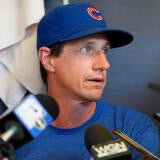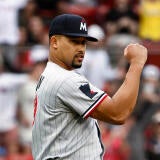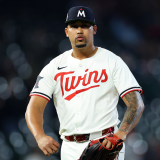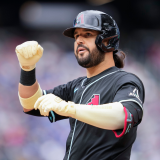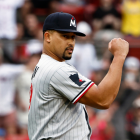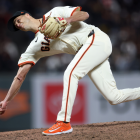Adrián Beltré set to be first-ballot Hall of Famer, but where does he rank among all-time great third basemen?
Adrián Beltré is almost a lock to make the Hall of Fame this voting cycle
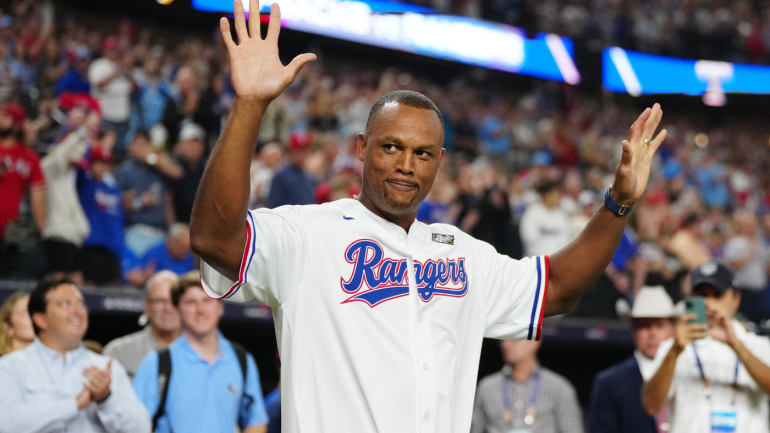
One of my favorite things to cover in this job is the Baseball Hall of Fame. Specifically, running through Hall cases of players on the ballot as we lead up to the January announcement of how the BBWAA vote breaks down and which, if any, players are new Hall of Fame inductees.
For the 2024 class, I've already broken down 10 things to know. At the top of the list is Mr. Adrián Beltré. There shouldn't really be an argument about whether or not Beltré gets in, but instead more a celebration of his case or even just keeping an eye on how high his vote percentage is.
We'll break down his case and his standing among all-time great third baseman in a second. First, a word about that pesky percentage.
Vote percentages
Mariano Rivera is the only unanimous vote-getter so far, while Derek Jeter is second with 99.74%. The highest mark for a primary third baseman is George Brett's 98.19%.
Now, it's ignorant to believe that the vote percentages are or should be a ranking of the best players ever. No one with a thorough understanding of the game's history believes Rivera is the best player ever and Jeter is second. We could find some laughable slotting if we wanted to, such as Willie Mays having the 20th highest percentage or Ted Williams sitting 24th.
I bring this up to hopefully head off any discussions of Beltré's percentage being "too high" at the proverbial pass. There's no reason to fret about such nonsense. Just get him over 75% and get him in on the first try and we're good.
The numbers
Beltré debuted in the majors at age 19 in 1998 to relatively great fanfare, as Baseball America ranked him as the third-best prospect in baseball before that season. He played all the way through his age-39 season in 2018, racking up 2,933 games. In 10 of his 21 seasons, he topped 150 games and he was over 140 four others.
During the course of all those games, he racked up an impressive dossier of counting stats.
Beltré ranks, all-time:
- 18th in hits with 3,166
- 65th in runs with 1,524
- 11th in doubles with 636
- 31st in home runs with 477
- 25th in RBI with 1,707
- 15th in extra-base hits
- 15th in total bases
- 40th in times on base
He's already in right there.
The rate stats aren't quite as pretty, but are plenty adequate for Hall induction. He hit .286 for his career with seven .300-plus seasons. The on-base percentage was .339 with a nice .480 slugging, good for a 116 career OPS+.
In terms of hardware and black ink, Beltre won five Gold Gloves (two of them were Platinum Gloves) and four Silver Sluggers. He was a four-time All-Star. He didn't win an MVP, but he finished second once, third once and seventh three times. He led the majors in hits once, doubles once and home runs once.
Given Beltré's incredible defensive prowess at third base, with excellent range, instincts and arm, an all-encompassing stat like WAR should be where he looks best, statistically. It was. He posted nine 5+ WAR seasons, topped 6 five times, 7 three times and hit 9.6 in 2004. For those unaware, the loose, general guideline is that 5 WAR is an All-Star-caliber season, 7.5 or above could be MVP-worthy and anything closing in on 10 is an all-time great season. Just to use 2023 as an example, Shohei Ohtani had 10.0, Ronald Acuña Jr. 8.2 and Mookie Betts 8.3.
Let's use this as a jumping off point to illustrate how amazing Beltré is at what has historically been an undervalued position in the Hall of Fame.
Beltré vs. all-time great 3B
In terms of career WAR, Beltré's 93.5 ranks 27th among position players and third among third baseman behind Mike Schmidt (106.8) and Eddie Mathews (96.0). Wade Boggs (91.4) and George Brett (88.6) come next.
Some might call Beltré a "compiler," a term that is meant as a bit of an insult. The accusation would be that the peak wasn't as great as others and players who compile just held on longer to make their counting stats look that much more pretty. The JAWS system, developed by Jay Jaffe, meshes career WAR with the WAR of the player's top seven seasons to account for a balance in compiling and peak performance.
Beltré sits fourth among third baseman here with Boggs passing him for third behind, respectively, Schmidt and Mathews. Brett is fifth, Chipper Jones is sixth, Ron Santo is seventh and Brooks Robinson is eighth.
The gold standard, defensively, at third base has long been believed to be Robinson and, sure enough, he beats everyone in defensive WAR at third. Rather handily. Beltre is second, though, and was a much better hitter than Robinson.
The career .286 batting average pales next to Boggs and even Brett, but slots in above Santo, Schmidt, Robinson and Scott Rolen. The slugging can't touch Chipper or Schmidt or Mathews, but tops Santo, Boggs and Paul Molitor.
Back to the compiling, though, Beltré was the greatest all-around offensive third baseman there ever was.
Only Molitor, Chipper and Brett scored more runs. Only Molitor had more hits. Only Brett had more doubles. Only Schmidt and Mathews had more homers. No one here had more RBI.
There's no arguing that Adrián Beltré was one of the 10 best third baseman in baseball history. There's a strong case that he's one of the top five and a pretty damn decent case he's one of the top three.
No matter where you fall here, we should all agree that this next month or so of Hall of Fame discussions should only mention Beltré either in passing, as a coronation or to eye that percentage. I'll go with a coronation.
Not only was Adrián Beltré an incredible baseball player, he was also incredibly entertaining to watch. In addition to his greatness there were quirks and, of course, there was his friendship with Elvis Andrus (also of note: He hates being touched on the head).
Is it too much to request that Elvis gives him one final pat on the head before his Hall of Fame speech?
![[object Object] Logo](https://sportshub.cbsistatic.com/i/2020/04/22/e9ceb731-8b3f-4c60-98fe-090ab66a2997/screen-shot-2020-04-22-at-11-04-56-am.png)


